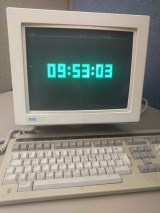opie(4) is no longer an option in several places in DragonFly. It’s also known as S/Key, and I’d be mildly surprised if you’ve used it.
Remember the commit that autocreates human-readable disk device names under /dev? (Here’s a reminder.) It’s now in 5.4 – technically, since 5.4.2. Anyway, it will automatically identify the root USB disk when you boot from a USB .img file, so you no longer have to guess which /dev/daX file it was – usually da8 but sometimes you got a surprise instead.
That sounds like a good thing, right? No automatic bugs, just manually placed ones. What it really means is that bugs.dragonflybsd.org no longer autocreates users, cause there was a certain amount of spam coming through freely created accounts there. It may be hard to tell the next step.
Sascha Wildner has committed mandoc(1) to DragonFly to use for man, whatis, apropos, and other functions. One less GNU utility, and also means groff can come out of the base system. That is almost the last C++ code in base… I am not sure what remains.
Because of the ongoing pmap work from Matthew Dillon, building vkernels may not work for a short period in DragonFly-master. “A short period” usually means a few days for this sort of thing.
Update: all better now.
Here’s something that might be useful: an example cleaning file for creating an AWS DragonFly image. Here’s the blob if you want to see what’s in it. I assume you will want to install awscli to use.
I’m jumping ahead in my very full queue of DragonFly items to post to something new: Matthew Dillon has committed extensive work to the virtual memory system in DragonFly. He has a message to users@ that sums it up.
If that’s not enough reading for you, I’ll point at commits where he reports speed improvements, changes to systat(1), or just 2-decade-old copyright items.
DragonFly 5.4.3 is out. My users@ post describes upgrading, as do the 5.4 release notes. This release has a fix for an Intel floating-point bug.
Images are available for download at various mirrors, too. If you’ve recently upgraded to 5.4, it’s the normal build process. There’s a brand new complete build of all packages uploaded, too, so plan on a ‘pkg update’.
This may never ever matter if you manage to avoid fdisk your whole life. But if you don’t pull that off, here’s the reminder: label your DragonFly slices with 108.
(Yes, I do in fact have a backlog of two months with DragonFly material. It’s been that constant.)
The callout_* API in DragonFly has been rewritten. This will only affect you if you are doing some very specific programming – but it will be intensely interesting if so. I mentioned it before, but don’t forget debugging.
I’m still playing catchup so it’s as of a few weeks ago, but the version 8 branch of gcc in DragonFly has been updated from 8.1 to 8.3, with backported fixes.
Related: gcc 5 is out.
Matthew Dillon’s committed some performance work for HAMMER2, dealing with write-clustering. I don’t have statistics to note, so here’s the commit message.
This timer fix enables booting DragonFly on AWS. Well, that and the ena(4) driver. I haven’t tried it yet.
If, like me, you’ve been running DragonFly for a long time, and you haven’t switched away from tcsh for your account or for root, you may not have ‘set autorehash’ in your .cshrc. Newer installs have it.
Put that into .cshrc if you don’t have it, and it’ll save 15 seconds of the rest of your life not typing ‘rehash’… assuming you can overcome the muscle reflex.
Matthew Dillon has committed two changes, both to DragonFly 5.4 and to DragonFly-current. His note to users@ explains the details. I don’t have a date for 5.4.2 being rolled out, but I expect soon.
This is the commit I should have linked to yesterday, and was reminded by an anonymous commenter: git: sys/vfs/fuse: Add initial FUSE support. It’s not complete, and so isn’t built by default; check the commit for details.
Remember my Wyse terminal experiment with a DragonFly VM? I mentioned an odd output pause where the screen would stop updating until there was keyboard activity – or occasionally just die. That was an artifact of Virtualbox; running this now in Qemu has no such problem.

I now have a very overcomplicated clock! I’m running GRDC on this Wyse-185 connected as a vt100 to the virtual machine running DragonFly 5.4 in Qemu on my Windows 10 work laptop. It’s at 9600 baud so I can see the numbers morph. I find this aesthetically satisfying.
Tomohiro Kusumi has committed more work on FUSE support in DragonFly. I am not sure if this is more foundational work or if it makes a user-level difference. At least the commit notes are nice.
Sepherosa Ziehau has an update for em(4)/igb(4) network cards, for you to test if you have the matching hardware. It looks like this is an update from the vendor, Intel, going by the version numbers.
DragonFly now has ministat(1), imported from FreeBSD thanks to Aaron LI. Use it on the output from your next run of benchmarking tools.
